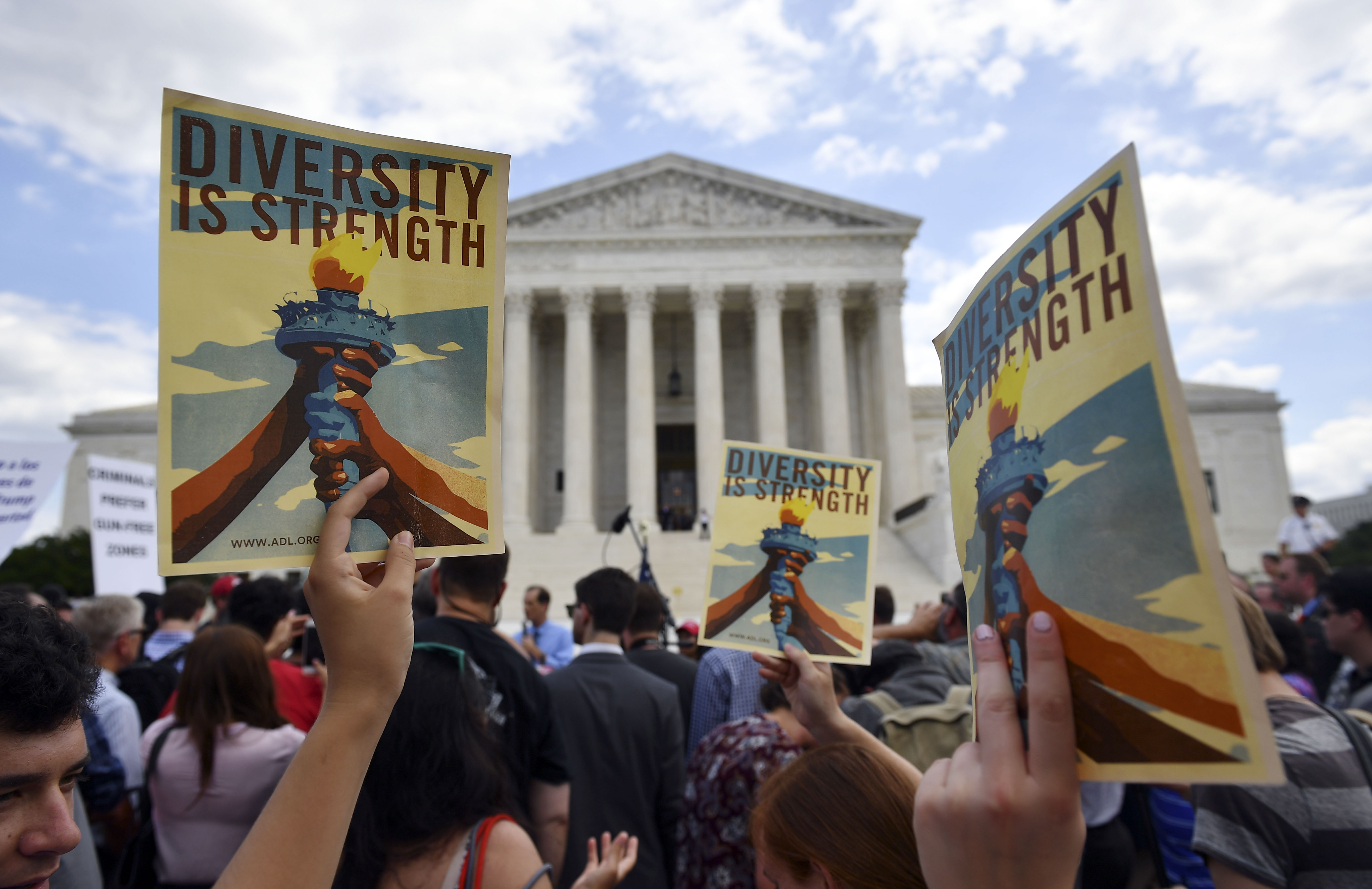US Supreme Court upholds Trump travel ban
Photo: () | ©AFP
Washington (AFP) – The US Supreme Court on Tuesday upheld Donald Trump’s controversial travel ban restricting entry to people from five Muslim-majority countries, delivering the president a major victory in a tortuous legal battle.
The win follows two embarrassing climbdowns for the administration’s “zero tolerance” policy on migrants crossing the Mexico border and with Trump under mounting pressure to legislate a solution to the immigration crisis, one of the most polarizing debates in US politics.
Conservative jurists prevailed over liberals in Tuesday’s majority opinion from America’s highest court. The 5-4 ruling validated the most recent version of the ban, which the Trump administration claims is driven by national security.
Trump pounced on the decision as a victory for his authority to defend national security. “Wow!” he tweeted just minutes after the ruling.
“The proclamation does not exceed any textual limit on the president’s authority,” wrote Chief Justice John Roberts in the majority opinion, capping a battle that began just days after Trump took office in January 2017.
“The government has set forth a sufficient national security justification to survive rational basis review. We express no view on the soundness of the policy.”
In a statement, Trump called the ruling “a moment of profound vindication following months of hysterical commentary from the media and Democratic politicians who refuse to do what it takes to secure our border and our country.”
The decision relates to Trump’s third travel ban, which applies to travelers from North Korea and five mainly Muslim nations — Iran, Libya, Somalia, Syria and Yemen — or about 150 million people.
A week into his presidency, Trump enacted a campaign promise and announced a 90-day ban on travelers from Iran, Iraq, Libya, Somalia, Sudan, Syria and Yemen.
– ‘Discriminatory policy’ –
He had repeatedly questioned the loyalty of Muslim immigrants and after a 2015 terror attack in San Bernardino, California, used his campaign to propose a “total and complete shutdown of Muslims entering the United States.”
Prepared in secret, the sudden order created chaos as hundreds of travelers were blocked at airports.
Tens of thousands of visas were canceled and protesters took to the streets saying the president was banning Muslims in violation of the constitution’s religious freedom protections.
Courts in several states ruled the measure illegal, and did so again in March 2017 after the administration slightly amended the original order, dropping Iraq from the list.
The US president was angered, but was forced to recast the ban again. Issued in September, the latest version was open-ended, dropped Sudan, and added North Korea and a selection of Venezuelan officials.
Opponents — and the court’s liberal-leaning justices — decried what they saw as a measure targeting Muslim countries, and referred back to Trump’s anti-Muslim statements during his election campaign.
The worst attacks in the United States since the Al-Qaeda hijackings on September 11, 2001 have been committed either by Americans or immigrants from countries not affected by the travel ban.
In a scathing dissenting opinion, Justice Sonia Sotomayor wrote: “Based on the evidence in the record, a reasonable observer would conclude that the Proclamation was motivated by anti-Muslim animus.”
She accused her colleagues of “blindly accepting the government’s misguided invitation to sanction a discriminatory policy motivated by animosity toward a disfavored group, all in the name of a superficial claim of national security.”
– ‘History will judge harshly’ –
The American Civil Liberties Union, which has been at the forefront of the fight against the ban, led an avalanche of criticism from liberals as activists rallied supporters for planned protests later on Tuesday.
“This is not the first time the court has been wrong, or has allowed official racism and xenophobia to continue rather than standing up to it. History has its eyes on us — and will judge today’s decision harshly,” it tweeted.
Omar Jadwat, director of the ACLU’s Immigrant Rights Project, said the ruling would “go down in history as one of the Supreme Court’s great failures.”
“This is a backward and un-American policy that fails to improve our national security,” said top Democrat, US Senator Chuck Schumer.
Immigration has been one of the thorniest issues in American politics for decades and the Trump administration has rolled back its “zero tolerance” border policy that had triggered international outcries over family separations.
Five days after halting the separation of children from their parents, on Monday it suspended its policy of automatically arresting and prosecuting every adult who crosses the border from Mexico without authorization.
US Attorney General Jeff Sessions was scheduled to address a criminal justice foundation in Los Angeles on Tuesday, with rights groups planning protests.
Sessions, who announced the “zero tolerance” policy in May, has said violent Central American gangs send children across the border illegally.
The House of Representatives intends to vote Wednesday on a broad immigration bill to end family separations, but its fate is in doubt. Should the bill fail, it would be a dramatic embarrassment for Republicans, who control Congress.
Disclaimer: This story has not been edited by Siliconeer and is published from a syndicated feed. Siliconeer does not assume any liability for the above story. Validity of the above story is for 7 Days from original date of publishing. Content copyright AFP.


